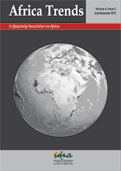Peace in South Sudan in the aftermath of the July 2016 Crisis
Events of July 2016 have shattered the progress towards peace in South Sudan. The international community needs to put in more efforts to ensure that leaders of warring factions fulfill their commitments for a peaceful future for the people of South Sudan.
- Adarsha Verma |
- July-September 2016 |
- Africa Trends





